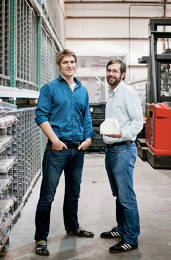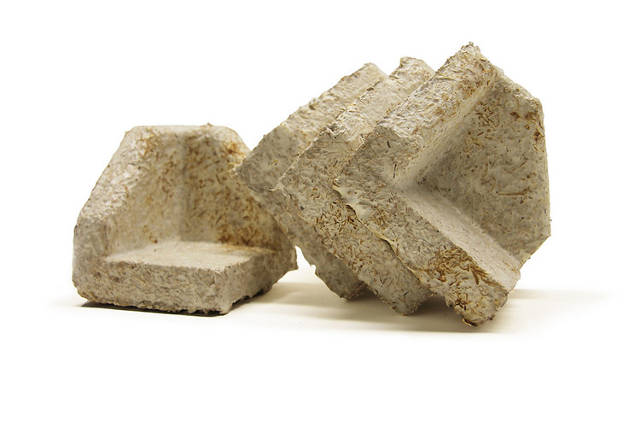
Maybe the most devastating aspect of styrofoam packaging is that it’s useful for a matter of days or hours–say, while a product ships–but it lasts for a millennium. Plastics like styrofoam currently take up between 25% and 30% of our landfill space, and a single cubic foot of styrofoam has the same energy content as about one and a half liters of gasoline. That’s a lot of impact for just a little bit of value.

And that’s precisely why college pals Eben Bayer and Gavin McIntyre establishedEcovative, which grows cost-effective alternatives to plastic insulation and packaging. While they were students at Rensselaer Polytechnic Institute, Bayer and McIntyre experimented with mycelium, the network of vegetative filaments in mushrooms, and realized that it could be used to form incredibly strong bonds. Essentially, the substance functions like a glue that you can grow and use to form agricultural byproducts like plant stalks and seed husks into natural alternatives to styrofoam packaging and insulation.
“It turns out that mycelium is actually a living polymer,” says Bayer, who graduated in 2007 and co-founded Ecovative that same year. “I like to think of it as low-tech biotech.”
After graduation, he and McIntyre continued working with mycelium and soon earned grants from the American Society of Mechanical Engineers and the National Collegiate Inventors and Innovators Alliance. Larger awards followed from the New York State Energy Research and Development Authority and the EPA; these allowed them to hone their concept and bring it closer to market. Bayer even performed a TED talk in 2010.
They’ve replaced toxic products–styrofoam and insulation–with superior proxies that are biocompatible with the planet (meaning they’re compostable). And perhaps the most compelling fact about Ecovative is that–like the product itself–the company continues to grow. What began as a bright idea between two college students is now the driving force for a company of more than 50 people. They’ve got a fully operational New York office and hope to open a 40,000-foot facility in the Midwest this summer. They’re even working on growing a house entirely out of the fungal materials. Ultimately, they’ve unearthed a natural solution to a consumer problem.

“All of our clients came to us because they have a problem,” said Bayer of styrofoam-based products. “They had to get out of plastic, either because their CEO said they’re not going to do any more plastic or because their customers called up and asked them to stop sending plastic waste with their products.”
Ecovative products use what Bayer calls a “whole-organism approach,” meaning that everything they grow goes into the final product. “There’s no extraction in the approach. The feedstock and the organism become the final product. This means our yield rates in comparison to every other company are phenomenal. It’s a tremendous challenge to replace a plastic like styrofoam–which is really cheap–at the same price and performance. It’s really hard; that’s why no one’s done it. But we’re thrilled to be able to get there. ”
